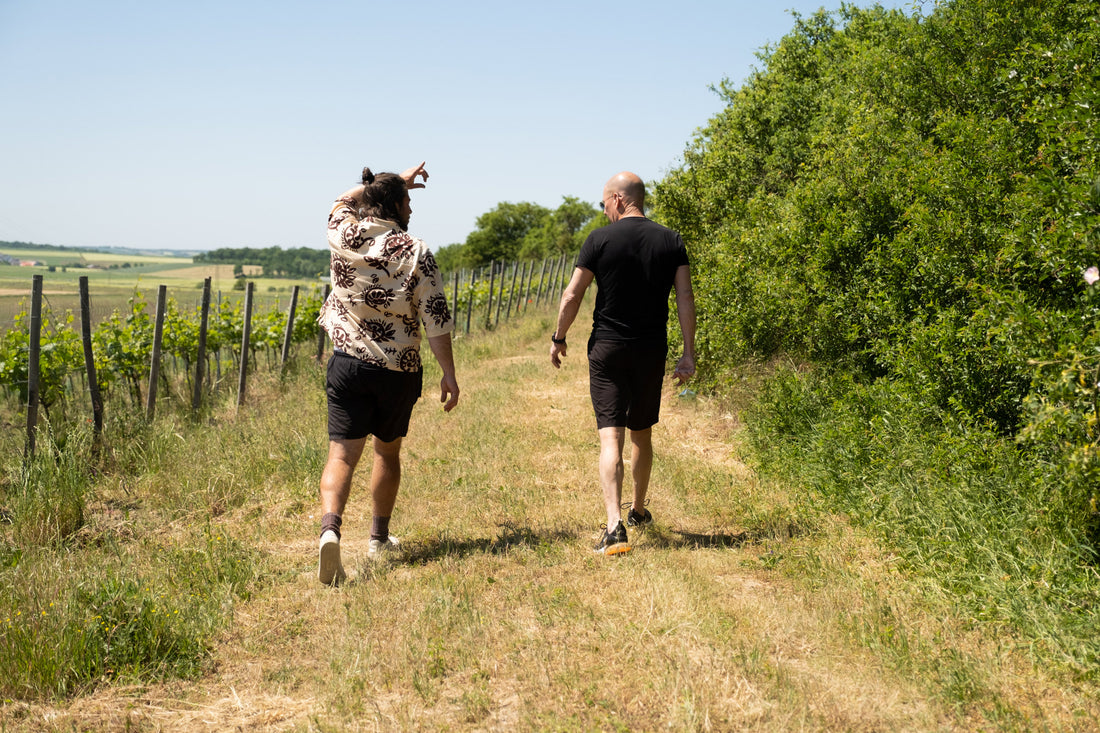Traveling through the countryside in Germany feels like a journey through time to 100 years ago. There’s a sense of tradition present everywhere - in the striking Bavarian architecture, in the hearty, meaty meals that seem to ignore the existence of most vegetables, or even in the dress of the townspeople, still donning traditional lederhosen. And while it feels like a charming fairy tale, the winemaking traditions of old have been replaced with modern pesticides, herbicides, and other shortcuts.
Lucky for us, Andi’s intrepid, young spirit brings the natural tradition back.
On our most recent trip to Germany, Andi Weigand showed us around his Franconian vineyards and the cellar, and gave us a precious window into the way that he views the world and winemaking.
He doesn’t dress like most winemakers we’ve met, greeting us in a stylish black and white shirt, his long hair draping elegantly over the collar. After almost everything he says, he lets out a little chuckle, “When I was in school, I wanted to be a DJ,” he tells us. He couldn’t break into the scene, but he still spins records for the wines in barrel in his cellar, “Natural winemaker, vinyl DJ, it just makes sense.”
Andi’s father only began making wine in 1990, and gave the cellar and the vineyards over to Andi in 2018. The Weigand winery quickly became the most progressive in the region. Of the twenty-five wineries in the village, only four are organic, and the Weigands are proudly the only biodynamic estate. They are also one of only two farms that don’t irrigate their vines.
“If you want to achieve something, you need to do it the hard way,” he says, “I want to have dirty hands, I want it to be real.”
Andi works the vineyards himself, with only the help of his father, and two apprentice winemakers. The way he describes everything in the vineyard makes it clear that the vines give him tremendous joy. When describing the vines now which are bearing tiny green globes eventually to become grapes, he’s animated like a sportscaster, “They are exploding, look at them! We had a very nice, wet winter, and you can see the vines are full of power.”
The hills here are quite steep, and the soils very rocky. Franken’s main industry is gypsum mining, and vestiges of this useful mineral freckle the sandy, gravelly keuper soils. The Triassic rock gives the white wines an herbaceousness and minerality that’s wholly unique to Franken. “We have a saying here, ‘Where there are rocks, there are vines.”’
While most would describe driving a tractor here as harrowing or terrifying, Andi says, “it’s like a rollercoaster.” There are nine and half hectares of vines that he cares for, so Andi gets a lot of rollercoaster rides in the year through to harvest.
Andi’s wines aren’t popular with the locals, about 80% are exported.
Perhaps the locals don’t understand why he does what he does in the vineyard, leaving wild grasses and cover crops to grow long and uncut, or why his cellar is full of big Franken barrels in a sea of stainless steel. In Franken, where simple white wines are celebrated, and drunk without much thought, Andi’s wines stand out: raw, full of life, and bursting with mineral power.

“My grandparents have no idea why I’m successful, our tasting room is empty all of the time,” he tells us. The winery has come a long way though, we met Andi at a wine fair only a few short years. “Back then, I didn’t even have any labels, I hand-cut them all!”

